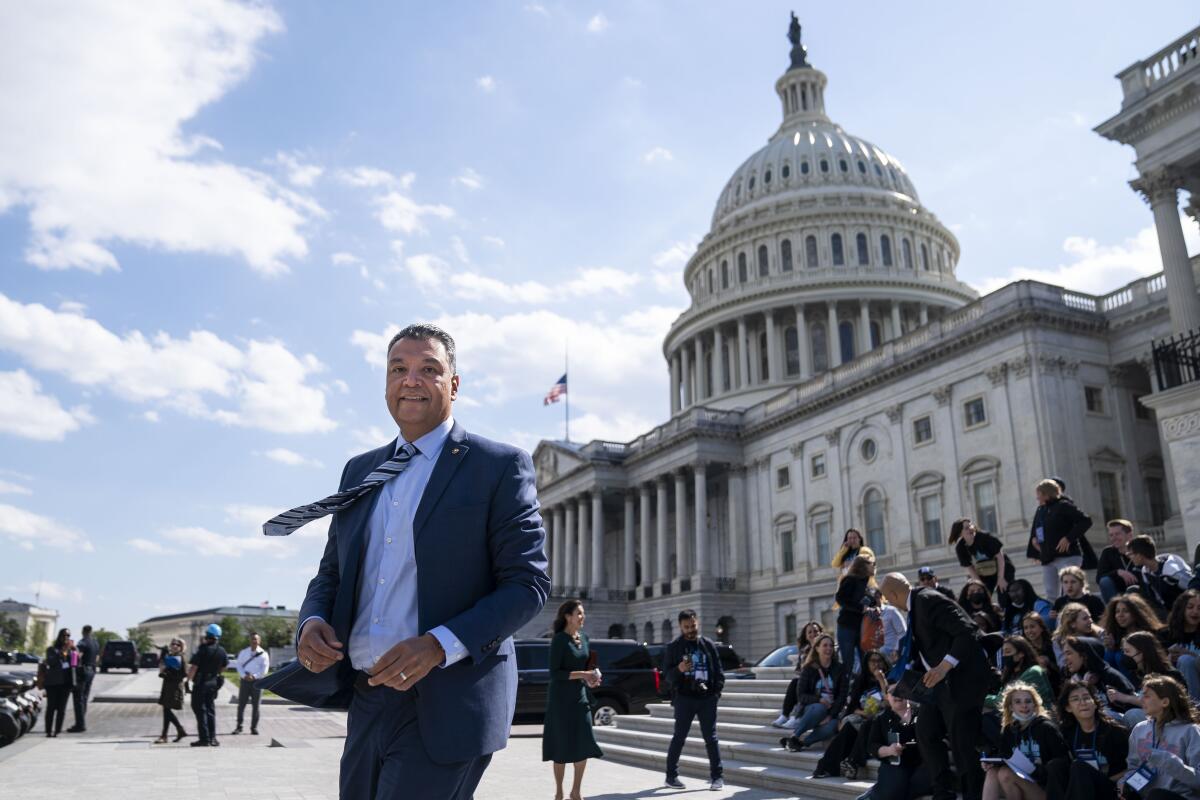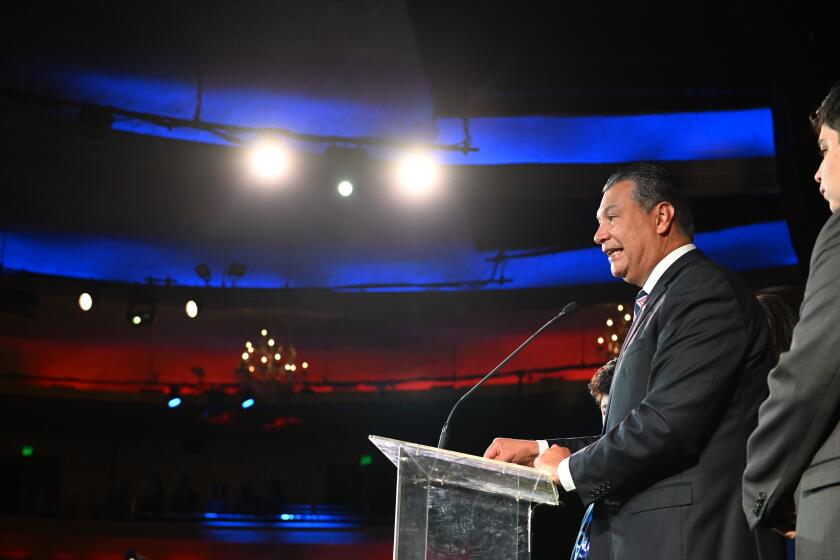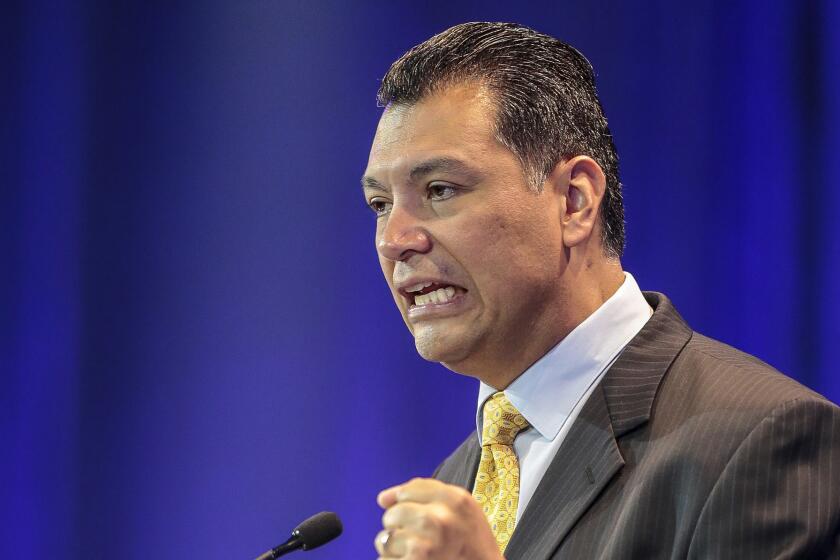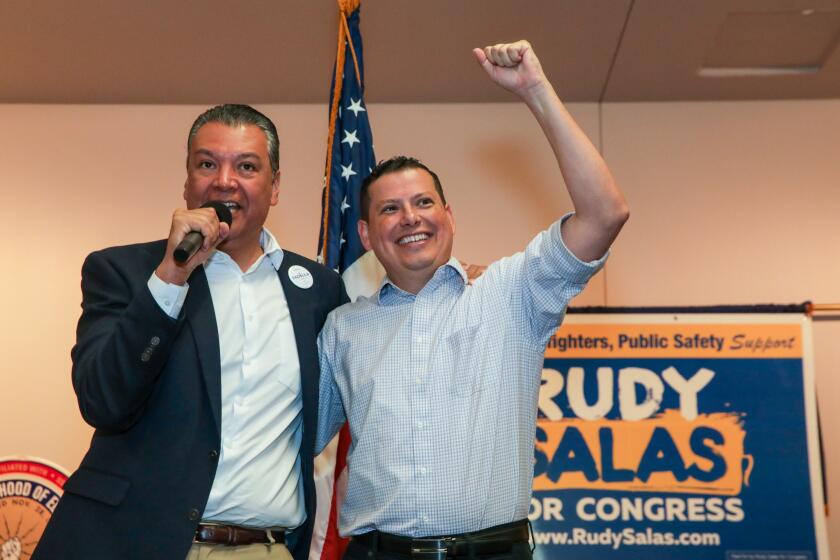Alex Padilla made history with his U.S. Senate win. What it means for Latinos

- Share via
Alex Padilla grew up on the polluted northern edge of Los Angeles framed by brown hills and freeways in a working-class community long neglected by the city.
His win as the first Latino elected to the U.S. Senate from California solidifies the profound shift in point of view — both cultural and geographic — that came with his appointment by Gov. Newsom two years ago and cements a long-marginalized community’s seat in the highest echelon of political power.
For the last 30 years, the state has elected its senators from a largely white and moneyed political class in the Bay Area that has produced some of California’s most renowned Democratic figures.
Padilla’s childhood in Pacoima could not have been further removed. His steady, low-key rise through Los Angeles City Hall and the state Capitol to join Dianne Feinstein in the Senate marks a soaring achievement for himself and California Latinos as a whole, who have struggled for decades to get adequate representation, even as they now constitute 40% of the state’s population.
“People look at someone like Alex and think, ‘OK, we have a voice. Someone there that is gonna listen to our issues and really cares about what is important to us,’” said Fabian Núñez, former speaker of the state Assembly and longtime friend of Padilla‘s. “And already he’s spoken up on immigration reform, more than I think we’ve seen in the U.S. Senate in a very long time.”
Núñez hopes Padilla can help recharge a working-class Latino electorate whose interest has waned in the Democratic Party.
“We’re losing a lot of Latinos from Democrat to an independent voter,” he said. “People like Alex are going to be crucial in terms of helping galvanize their vote.”
Alex Padilla wins election to the Senate seat he was appointed to after Kamala Harris became vice president; results unknown in competitive House races.
Padilla’s success is a stark counterpoint to the recent implosion of the Latino political structure in Los Angeles, where his high school classmate and political ally, Nury Martinez, resigned from her City Council seat over racist remarks she made on a secretly recorded tape with Councilmembers Gil Cedillo and Kevin de León, who are both facing widespread calls to step down.
Padilla, 49, was the first prominent elected official to push for the trio’s resignation.
“It shows the natural progression or maturation of leadership,” said Fernando Guerra, a political science professor and founding director of the Center for the Study of Los Angeles at Loyola Marymount University.
Guerra said Padilla communicated to the citywide Latino leadership and electorate that there are lines that no one can cross, even good friends. “When Alex Padilla asked for that resignation, nobody else would have an excuse not to.”
While Guerra conceded that Padilla’s election was slightly “anticlimactic” — more or less a foregone conclusion given Democrats’ overwhelming voter registration edge in the state — he said it doesn’t minimize the accomplishment.
“The pinnacle of elected office in California is governor, quickly followed by the two U.S. Senate positions,” he said.
Padilla’s position was effectively sealed when Newsom appointed him to replace Sen. Kamala Harris when she became vice president-elect in 2020.
Padilla, considered a politician to watch since his 20s, has served on the L.A. City Council, in the Legislature and as California secretary of state.
The governor was under heavy pressure to appoint a Black politician to replace her, notably either Reps. Karen Bass or Barbara Lee. Harris was one of three Black senators at the time, and the only female. But Newsom had a longstanding personal and political relationship with Padilla, who had run his brief campaign for governor in 2010. The governor risked creating a schism in the party when he picked Padilla.
“Gov. Newsom took a chance on him in some ways, and it’s paying dividends,” said Lorena Gonzalez, a former state assemblywoman who heads the California Labor Federation. “He understands what so many Mexican Americans and Latinos in California go through because he went through it, and he understands the importance of those economic working-class issues and puts them forward and is true to his values.”
Although Padilla is not prone to soaring rhetoric and does not draw excited crowds, he has been more successful than many more charismatic, camera-ready politicians.
“He’s not a firebrand in any sense of the word,” said Bill Carrick, a Democratic strategist. “But for somebody who’s still relatively young, he has an enormous amount of resume.”
With Congress at a potential tipping point, Sen. Alex Padilla is spending much of his energy stumping for Democrats in closer races than his own.
Padilla’s backers hope he leverages his background to strike a new course in Washington.
“What would be helpful for him is if he can break out of the pack a little bit,” said Andrew Acosta, another Democratic strategist. “Maybe after he won the election, the opportunity going forward is where he can create more of a path for himself, where you’re not falling behind another politician, another senator.”
His election also marks a geographical shift in the locus of power in the state. Although the majority of the state’s residents live in Southern California, the two Senate seats have been held by Bay Area Democrats for three decades.
Sen. Feinstein, former Sen. Barbara Boxer and briefly Sen. Harris shaped California’s priorities in the upper chamber, making major strides on issues such as women’s rights and the environment, said Sonja Diaz, founding executive director of UCLA‘s Latino Policy and Politics Institute.
“In many ways, our politics in California has been governed by the policy interests and leadership of the Bay Area,” she said.
Padilla, she expects, will change that, bringing more urgency to issues facing urban communities of color.
“Sen. Boxer was really big on the environment. That’s completely different when you’re talking about Pacoima or Sun Valley or Los Angeles or the Inland Empire,” Diaz said. “You’re talking about air pollution concentrated in places that are Black and brown communities. You are not talking about coastal preservation. Similarly with immigration, Diane Feinstein has not led on those issues. Politicians from Southern California in the modern era have recognized that immigrants are integral.”
It was immigration that got Padilla into politics — or, more accurately, his dismay over rising anti-immigrant sentiment sweeping over the state in the 1990s. The inward son of a Mexican-born housekeeper and short-order cook, he dreamed of being an aerospace engineer and graduated from the Massachusetts Institute of Technology. But he didn’t want to stand by as people attacked his community.
While living in his parents’ home after college, he ran for a seat on the Los Angeles City Council and won, becoming its youngest member at 26. He managed to rise in the sharp-elbowed realm of L.A. and then Sacramento politics despite his easygoing demeanor.
“The humility in the way he approaches things, the fact that he doesn’t come across as self-serving, he thinks about the greater good, all of those things are going to serve him well,” Núñez said.
Padilla speaks in measured tones and has a humble air. He talks about the awkward blind date at a bowling alley when he met his wife, or helping his three sons with baseball and math.
In an interview Thursday, he recalled what his uncle told him when he won his seat on the council: “Congratulations. Now, it’s time to make good on your promises.”
“I do think the perspective and the voice of somebody like me is necessary to be at the table, whether it’s my background as the proud son of immigrants, whether it’s my background of having been born and raised in Southern California, my engineering background,” Padilla said.
His governing has been grounded in his life experience. After his mother was diagnosed with Type 2 diabetes, he handed out pedometers to his colleagues on the Los Angeles City Council and successfully passed legislation as a state senator to require restaurants to post calorie counts.
Early on in the Senate, he set his sights on immigration. He is the first Latino to chair the Senate Judiciary Committee’s Subcommittee on Immigration, Citizenship, and Border Safety. Two months into his term, he was already pushing to create a path to citizenship for more than 5 million essential workers in the U.S. illegally.
And even his relative youth in the Senate provides a different vantage at times. During discussions of child care, for instance, he said many of his colleagues are speaking from the perspective of grandparents, while he has one son in high school and two in elementary school.
Gonzalez, the California Labor Federation head, says Padilla is “a shining example of what every Mexican immigrant that came to this country has wanted for their child.”
“He has a story to tell that embodies so much of what is important to us, to a large community that never quite had that person.”
More to Read
Get the L.A. Times Politics newsletter
Deeply reported insights into legislation, politics and policy from Sacramento, Washington and beyond. In your inbox three times per week.
You may occasionally receive promotional content from the Los Angeles Times.















